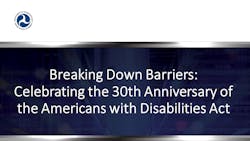USDOT celebrates 30th anniversary of the Americans with Disabilities Act
The U.S. Department of Transportation (USDOT) is creating a first-of-its-kind accessibility strategic plan as it works to achieve access and mobility for all in transportation, according to an announcement by U.S. Secretary of Transportation Elaine L. Chao.
“This strategic plan creates a unified vision for the department to support the development of new inclusive, affordable transportation technologies that address mobility and access challenges,” said Secretary Chao.
Secretary Chao made the announcement during a virtual event the department held July 30 with leadership across the department and agencies across the federal government to commemorate the 30th anniversary of the Americans with Disabilities Act (ADA), which was signed on July 26, 1990.
While accessibility has always been an important priority for the department, current accessibility initiatives are spread out through different operating administrations and offices. The plan will provide a single, cohesive strategic plan dedicated to ensuring that the department is prioritizing and working diligently to increase access to transportation for people with disabilities. This plan will ensure that the department has a unified vision on accessibility, and that there are no gaps in efforts.
Secretary Chao also announced a new University Transportation Center grant to research the implication of Automated Vehicles and Mobility Services for people with disabilities, which was awarded to the University of Pittsburgh, in consortium with the Uniformed Services University of Health Sciences and the Catholic University of America. The department will provide a $1 million grant for 18 months to conduct research. The research will explore increasing access for various populations with disabilities by deploying automated technologies and services. The grant will provide insight regarding accessibility opportunities that may materialize as vehicles and mobility services evolve.
As transportation evolves, the department says it is committed to a more accessible future. Secretary Chao also announced that the department is undertaking a new initiative, at nearly $1 million, that will establish a library of resources for accessibility in automation, and will work with outside experts to study voluntary best practices for ensuring accessibility in automated vehicles.
The virtual event also included a panel on Building an Accessible Future: Transportation and Beyond. The event concluded with leaders of the various operating administrations of the department presenting on the impacts of the ADA on their transportation mode, notable accomplishments and recent efforts on accessibility.
As part of these ongoing accessibility initiatives, the first phase of the department’s Inclusive Design Challenge remains open for proposals through Oct. 30. Interested parties are encouraged to submit their ideas.
